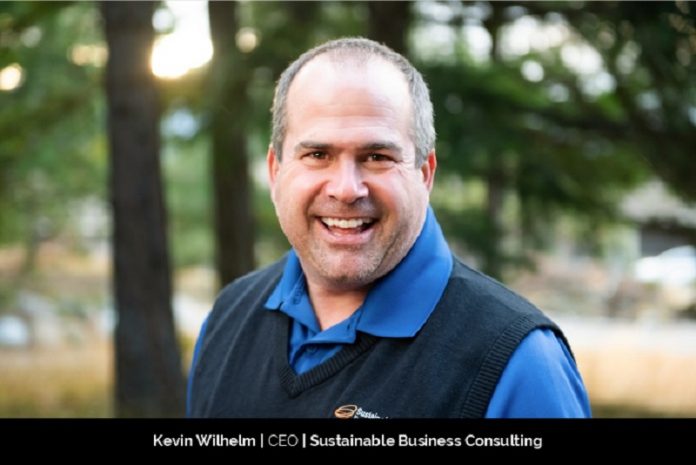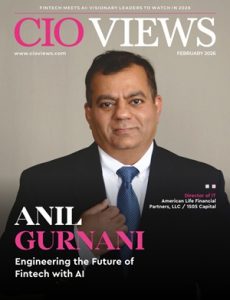Sustainability is now a business imperative. Recently released guidelines from the Securities and Exchange Commission on climate, an increased focus on diversity, equity & inclusion, and new governance requirements for businesses on data privacy mean that having a sustainability program is no longer a “nice to have.” Companies that take positive action on environmental, social, and governance (ESG) issues will be more resilient and better prepared to respond to impacts from extreme weather events and societal disruptions from wars, pandemics, and supply chain issues. Moreover, employees, customers, investors, and everyone throughout the value chain now expect action in these areas.
Kevin Wilhelm knows this all too well. A world-renowned consultant, teacher and thought leader in the field of ESG and climate change, he has been dedicated to the cause for more than 20 years. Through his work as CEO of Sustainable Business Consulting, Kevin has partnered with more than 240 businesses ranging from Fortune 100 multinationals to cities, counties, and federal agencies to support their sustainability ambitions.
From humble beginnings
“I still have trouble thinking of myself as an entrepreneur – because I had no intention of starting my own firm,” said Wilhelm reflecting on his journey. It was after reading the IPCC report in 2006 where he was so moved by the threat of climate change, but also inspired by the opportunity for businesses to act, that he felt empowered to do something.
So, he went around and talked to principals at over 40 consulting firms in Seattle stating, “we need to find a way to make the business case for sustainability!” The response was almost unanimous and each leader he talked to punted and said “yes, yes, someone needs to do that.” But nobody seemed willing to step up to the plate. That’s when Kevin said, “okay then, I guess I’ll have to do it!”
Armed with a ‘war chest’ of $500, Kevin started to evangelize the message of sustainable business and recruited interns to help him get started. In fact, the absolute best intern he hired to lay the foundation, Ruth Lee, still works with him today and is now his business partner. “It’s not an ‘I’ who laid the foundation, it’s ‘we’,” Kevin emphasized.
Under Kevin’s leadership, SBC went from a one-person shop working out of a second bedroom in his apartment to a firm that has successfully worked with 240+ clients across 37 industries. Working partners include companies like Delta Airlines, New York Life, Estee Lauder, REI, Expedia, Grocery Outlet, CarMax, At Home, Alaska Airlines, and Tommy Bahama.
Seeing Opportunity in Adversity
Kevin’s journey was not an easy one. In fact, while the term is commonplace nowadays, back in early 2001 nobody understood the language of sustainability. Most people held the belief that doing anything for the environment would cost more, add more red tape, and would just be more difficult. “I couldn’t even tell people I was trying to help them be more sustainable because to them it was seen as ‘anti-auto, ‘anti-union’ and ‘anti-jobs’.”
He explains that initially he had to work under the guise of business strategy, cost savings, and competitive advantage. “Back in the day, I could never share my true motive of working towards a more environmentally friendly or socially just planet. I had to covertly frame my services in a way that allowed us to do the work, while helping my clients make money under the guise of traditional business practices.”
When Kevin launched SBC in 2004, he still had to convince most people about the business case for sustainability. “Our consulting practice was never about shoving environmentalism or social justice down people’s throats. We’ve always set out to first listen and understand what challenges companies are facing, and then devise win-win solutions that meet their business objectives and can advance sustainability.”
As Kevin went on to say, “too often in this business, it’s about explaining why someone else should care about what you do. The reality is, we need to listen to what other people’s needs are, put things in their language, focus on what they care about, and then figure out how to help them meet their goals through sustainable business.”
Kevin’s determination helped his company not only survive but thrive despite choppy waters, including during the financial crisis of 2008 and more recently the COVID-19 pandemic. “Let’s face it, during a budgetary crisis, sustainability consultants are pretty much the first thing on the chopping block. In fact, in the first week of the pandemic, we lost twenty-eight client projects and our revenue forecasts were cut in half in four days. Fortunately, we had learned from the 2008 financial crisis to have a broad client base and to always keep a deep cash reserve. Our motto has always been to hope for the best but plan for the worst.”
By always focusing on what was most important to their clients and keeping an eye to the future, SBC was able to not only survive the pandemic without laying anyone off, but also grow by over 50% in 2020 and 2021.
“I’ve always tried to follow Wayne Gretzky’s motto of, ‘don’t skate to where the puck is, but to where it’s going to be.’”
Career highlights
Helping businesses build capacity on sustainability and ESG has been a challenging yet deeply rewarding process for Wilhelm. However, Wilhelm’s contribution to defining the sustainability industry has been further enhanced through his status as an author and teacher on ESG subjects at Harvard.
“I never had any intention of writing a book, but after flying around the country to give the same basic speeches over and over again, I realized that a more efficient and less carbon intensive way to do that was to share my message through a book. I have now authored 5 books and written chapters in 4 others.”
In fact, one of Kevin’s proudest moments was winning the individual leadership award from Climate Change Business Journal and Environmental Business International for his efforts to break down barriers through his book, How to Talk to the Other Side – Finding Common Ground in a time of Coronavirus, Climate Change and Economic Uncertainty.
Other books by Kevin include Return on Sustainability, Making Sustainability Stick, Sustainability Jobs and Intangible Value.
Defining success
For Kevin, success is more than numbers and recognition. “Success is taking care of your employees and making a positive impact on the world, but doing so in a way that is rewarding and fun. We are facing tremendous environmental and social challenges today. The only way you’ll have energy to tackle these issues is if your work is meaningful and you feel a sense of worth. At SBC we like to say, take the work seriously but not yourself.”
Wilhelm views employee-wellbeing as a critical component of his company’s success and this has been a top priority since day one. “There’s a motto taught at business schools that shareholders are the number one priority and the customer is always right, but I’ve never subscribed to that. Your most important and valuable assets show up every day – your employees. We make sure that our employees are taken care of in terms of life-work balance, wellness, career opportunities, and financial security,” Kevin explained.
Wilhelm tries to be a good role model for his team by making sure to take personal time, going for walks each day, taking vacations, and celebrating the small victories both personally and professionally.
The Future of Sustainable Business Consulting
Wilhelm believes that businesses need to act now, and in a major way, if we are going to have a chance of stopping climate change within the next 7.5 years.
“Our goals have shifted constantly over these 17 years. When we started out, the hope was to get a few big companies to develop climate strategies that made business sense. Now the goal is nothing short of stopping climate change.” What does the future hold for SBC and Kevin Wilhelm? Well, according to him, whatever it takes to battle the climate crisis while striving for a more socially just world.
What does this mean for his company exactly? On a tactical level, there are two key areas SBC will be focusing on with their clients in the immediate future. The first is encouraging companies to set science-based GHG reduction targets, engaging their entire supply chain in the process. “We’ve been helping clients with their supplier engagement strategies for years now, but tackling Scope 3 emissions in particular is emerging as an absolute must for meaningful impact,” Wilhelm explained. “Second, we’re responding to the increasing importance of ESG and climate disclosure regulation from the SEC with a renewed focus on best-in-class frameworks such as CDP, TCFD, and SASB.”
According to Wilhelm, things that were cutting edge just a few years ago are now table stakes – including ESG reporting and creating climate action plans. “The field is changing each month, but right now what I’m most excited about is the increasing recognition that financial, environmental, and social justice issues are all intertwined. Throughout our history, we’ve show that taking proactive action on these issues can lead to increased profitability, enhanced brand value, reduced risk, and better employee retention. If we can get more businesses on board, nothing should hold us back.”
Just as “e-business” is just how companies operate these days, Kevin predicts that sustainability will soon become the only way, not a way, of doing business.





